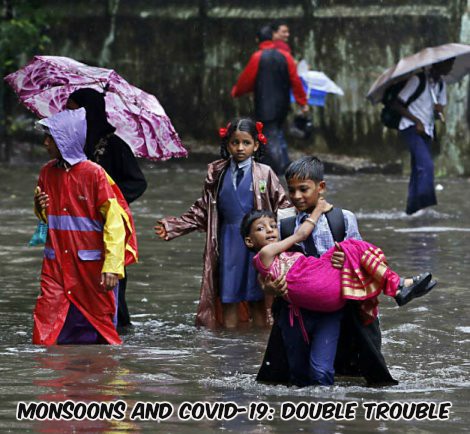

By A Special Correspondent
First publised on 2020-06-17 08:48:47
The monsoon has arrived in India. The IMD has predicted a normal monsoon with the intensity of the rainfall between 96 and 104 percent of the long period average. In normal times, this news and the timely arrival of the monsoon would have gladdened millions of hearts as nearly 50% of the Indian workforce is engaged in agriculture (and countless others depend on it either directly or indirectly) which in turn in dependant on the monsoon in a huge way. But these are not normal times. The Covid-19 pandemic is sweeping across India (as also in many other parts of the world), and the monsoon rains bring with them a host of water-borne and vector-borne diseases. That will complicate matters, especially in India.
That is because some of the first symptoms of many diseases which are predominant during the monsoons, like malaria, dengue, leptospirosis and common flu, are very similar to those of Covid-19. That will mean that when patients visit hospitals with any of these diseases, the doctor will first have to test for common monsoon diseases and if found negative, a Covid-19 test will also have to be done to check for the virus. Further, when people start getting sick due to the diseases prevalent during the monsoons, it will put additional pressure on the already creaking medical infrastructure across the country. No city, town or state in India has the medical infrastructure to handle this double pressure.
Corporations and municipalities in all urban agglomerations across India that receive a fair share of the monsoon rains have many things to do just before or during the monsoons. From desilting of drains, fogging, checking of houses for stagnant water to distributing medicines, among others, all these things are done every year. But this year, due to the pandemic, the frontline medical and sanitation workers will be primarily engaged in tackling the upsurge in Covid-19 cases. Hence, local bodies will not be able to provide staff for monsoon-related duties. There will be problems all over India but Mumbai, already in a severe grip of Covid-19, will face the maximum problems. It is a situation that can turn to disaster. Hence, this year, the public will have to be extra vigilant and will have to support and help the local bodies in order to prevent the outbreak of monsoon-related diseases. Local bodies too will have to find ways - hire volunteers or temporary staff, for instance - to conduct the absolutely essential monsoon-related services.











